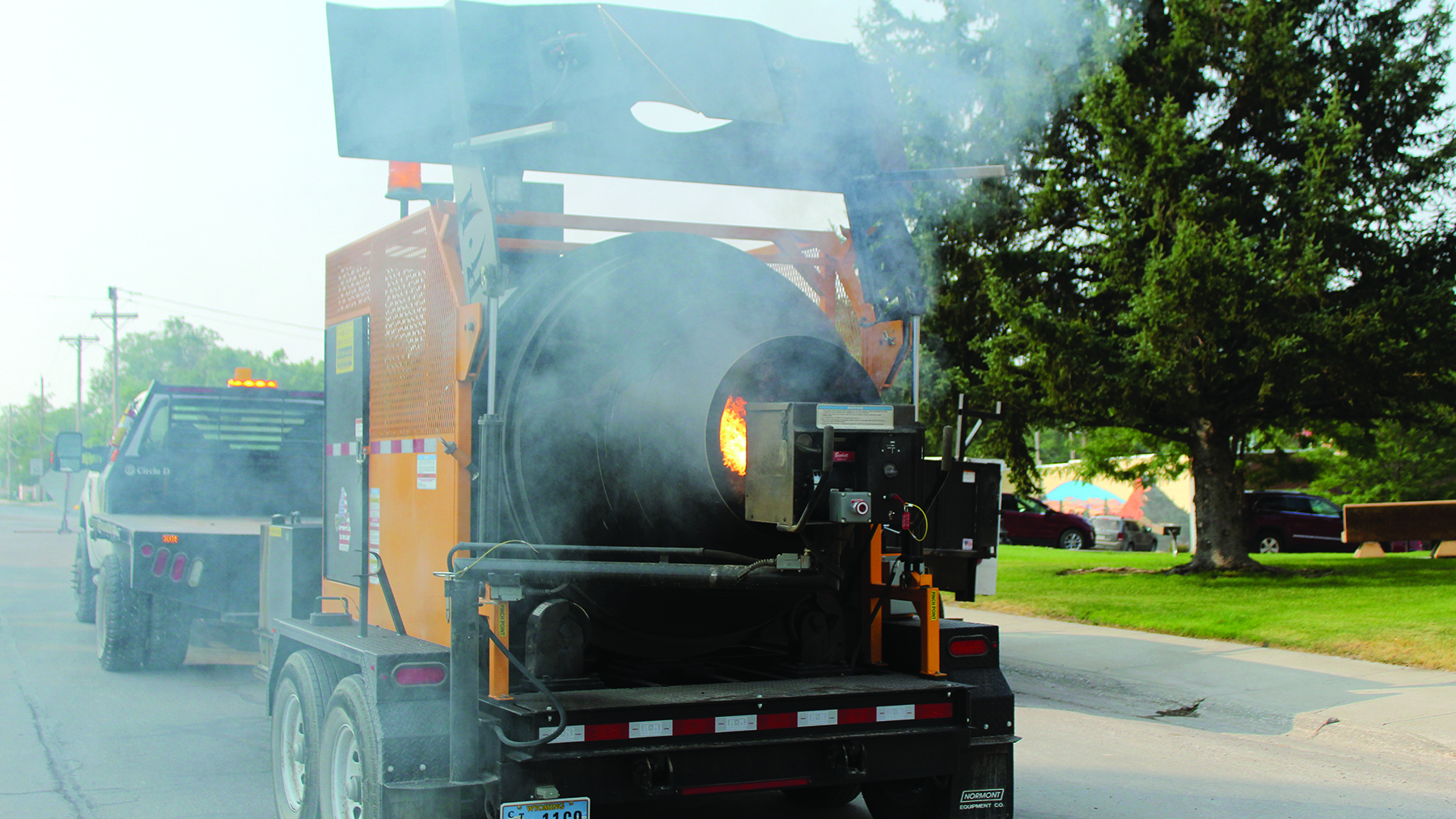New machine saves city big money

Photos by Walter Sprague/NLJ Using 700,000 BTUs to heat old asphalt more than 350 degrees, a load is prepared in the KM T2 Asphalt Recycler to patch the road on North Summit Avenue by the courthouse on Wednesday, July 24.
Significant savings are in store for the city of Newcastle on patching existing paved roads due to the purchase of a new piece of machinery last year. The City Council approved the purchase of a new asphalt recycler on May 15, 2023, and the purchase and payment were made on June 5, 2023, for about $110,000. The public works department has been using the new recycler to repair roads in the city in line with a multiyear improvement plan implemented by the department’s supervisor, Greg Stumpff.
According to Stumpff, the KM T2 Asphalt Recycler will save the city enough money that the machine should pay for itself in less than two years.
“Last year, the road materials budget was about $125,000. This year, it was dropped to $50,000, which is generous given the amount we will need for the materials,” Stumpff said.
Accordingly, Stumpff said that around $75,000 was actually spent on materials in 2023. He anticipates that figure will drop below $10,000 in 2024.
Stumpff said that materials to patch the sections of road used to be about $99 per ton of asphalt, but with the new recycler, that cost drops to $10 per ton.
“Most of the cost was in the transportation of the asphalt from other locations and the use of equipment not owned by the city,” Stumpff said. “It wasn’t actually the cost of the used asphalt itself.”
The new recycler means the city can use the ground-up asphalt stored near the gun range. Because the supply and equipment are now local, transportation and use of
the recycler are much less expensive.
Stumpff said that the city used about 700 tons in 2023, and with similar use projected for this year, according to current improvement plans, the city is going to show significant savings immediately. While the asphalt recycler is not meant to be used for large paving projects, there are plenty of small patching jobs around the city to justify the purchase of the large machine.
For example, a section of asphalt on Summit Avenue next to the county courthouse was patched over a few days last week. This patching was part of repairing a water leak that had been a problem for quite some time but was fixed earlier in the year. On Wednesday, July 24, the city pulled in the machine to put down the recycled asphalt. A large heating unit is put in place after the ground-up old asphalt is loaded into the recycler. Burning a type of diesel and operating at 700,000 BTUs, the asphalt is rotated around the drum and heated to at least 350 degrees.
Jeremy Deal, with public works, said the drum itself will heat up to 800 or 900 degrees. The asphalt starts to release the oils in the tar, and it begins to turn into a hot slurry. As the used asphalt heats up, it also turns from a dusty gray color into a rich black. Deal scanned a sample of the asphalt after it looked right. It was 375 degrees. Using a skid steer, the heated asphalt was dumped into the section of cutout roadway to be patched.
“At first, we have to build up a ramp along one edge so that we don’t crush the existing pavement,” said John Heldberg, a member of the public works crew. “Once that is done, you can drive into the hole to dump the asphalt where you need it.”
After shoveling and raking the asphalt into place, a steam roller was used to flatten it and heat it up again. The asphalt is placed in layers to create a solid base, and the top layer(s) are put down. According to Heldberg, this creates a much stronger road than laying all of it at once.
Once the water and sewer are repaired in sections, the city can continue patching the roads each summer, when the warmer weather improves the quality of the patches.
Stumpff says there are years of work to bring the city roads to the standard he wants to see, but the improvement plans lay out those sections of water/sewer repair and then patching the roadways. He also said that this will be a never-ending cycle of repair to the roads, especially with the potential for harsh winters and freezing temperatures. However, he said he is optimistic about the amount of money the city will save that can be used for other infrastructure improvements as the years go by.






